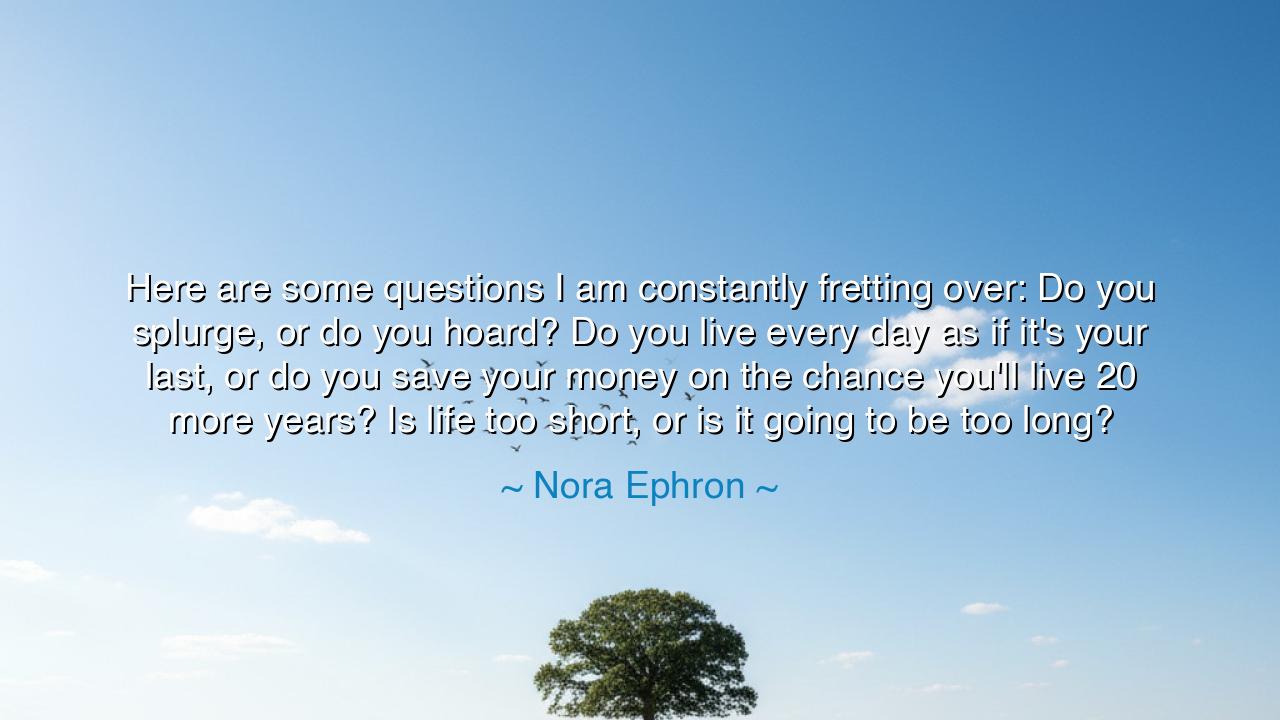
Here are some questions I am constantly fretting over: Do you
Here are some questions I am constantly fretting over: Do you splurge, or do you hoard? Do you live every day as if it's your last, or do you save your money on the chance you'll live 20 more years? Is life too short, or is it going to be too long?






"Here are some questions I am constantly fretting over: Do you splurge, or do you hoard? Do you live every day as if it's your last, or do you save your money on the chance you'll live 20 more years? Is life too short, or is it going to be too long?" These profound questions by Nora Ephron touch upon the eternal tension between the fleeting nature of life and the wisdom of preparing for the future. Ephron’s words reflect a struggle that many of us face—the balance between living fully in the present and planning for an uncertain future. Her reflection is a universal query about the nature of life, and whether we should prioritize the present moment or plan for a future that, at times, seems so distant and uncertain.
This very tension between living for today and preparing for tomorrow has echoed throughout ancient philosophy. In the Hellenistic era, Epicurus proposed that the goal of life should be to seek pleasure and avoid pain, advocating for a life lived in the moment, embracing enjoyment while avoiding excess. Yet, the great Stoic philosophers, such as Seneca and Epictetus, argued that we should take a long-term view of life, cultivating virtue and wisdom, rather than seeking transient pleasures. For them, the pursuit of happiness lay not in indulgence, but in careful consideration of what is truly lasting. These contrasting views—hedonism versus stoicism—are the philosophical underpinnings of Ephron’s questions, as she contemplates whether to splurge in the present or to hoard for the future.
The tension Ephron describes mirrors the ancient struggles faced by Alexander the Great. When he was young, Alexander was driven by the dream of glory—a desire to conquer the known world and live fully in the moment. But as he grew older, he began to face the consequences of his ambitious plans and the uncertainty of his legacy. Alexander’s life was a balance between living for glory and preparing for the long-term survival of his empire. In the end, his splurge in seeking fame and power came with the cost of untimely death and a kingdom fractured after his passing. His story serves as a cautionary tale, one in which a life lived for the present without considering the future can leave one empty-handed.
Consider the life of Marcus Aurelius, another figure from the ancient world, who faced these same questions, but through the lens of a Stoic emperor. In his Meditations, he repeatedly writes about the shortness of life and the importance of focusing on the present moment while also ensuring that one’s actions are aligned with virtue and long-term duty. Marcus, despite his vast power and responsibility, understood that time is fleeting, and he sought to live wisely, balancing the immediacy of action with the foresight of thoughtful governance. His approach to life and leadership demonstrates the power of self-discipline—living fully in the present without sacrificing the future through thoughtless indulgence.
Ephron’s questions also delve into the concept of time, which the ancient philosophers saw as the most precious and fleeting of resources. Socrates, who spent much of his life discussing the value of time, famously said that an unexamined life is not worth living. His idea was that we must question how we use our time, as it is the most valuable asset we possess. Ephron, in her reflection, is grappling with the same paradox: How do we live fully and meaningfully without wasting the time we have? How do we balance the fleeting nature of time with the desire to make meaningful choices for the long run?
The lesson Ephron imparts is one of balance—recognizing that life’s shortness and uncertainty must not lead us into recklessness, nor should they make us so focused on the future that we forget to live. Her question about whether life is too short or too long is a reminder that time is not an enemy to be fought, but a companion to be understood. We must live with intention, using each moment wisely while also preparing for the future with thoughtful care. Just as Marcus Aurelius balanced action and reflection, we too must seek harmony between living fully today and saving wisely for tomorrow.
In practical terms, Ephron’s reflection calls us to examine our daily choices, our financial decisions, and our approach to life’s uncertainties. Are we living with purpose, or are we merely floating through the days without consideration of what we wish to leave behind? In relationships, career, and self-care, we must be mindful of how we spend our time—investing in what matters most while still ensuring we are prepared for the future. Like Ephron, we must question whether we are balancing our choices wisely, ensuring that our decisions reflect both living fully in the present and wise stewardship of the future.
Thus, the lesson from Ephron’s words is clear: life is fleeting, and time cannot be hoarded or wasted. We must live wisely, investing in both the present and the future, so that we may find a sense of fulfillment in both the moments we experience and the legacies we leave behind. Let us, like the philosophers of old, embrace the balance between living and planning, knowing that only through thoughtful living can we achieve true peace and harmony in our lives.






AAdministratorAdministrator
Welcome, honored guests. Please leave a comment, we will respond soon